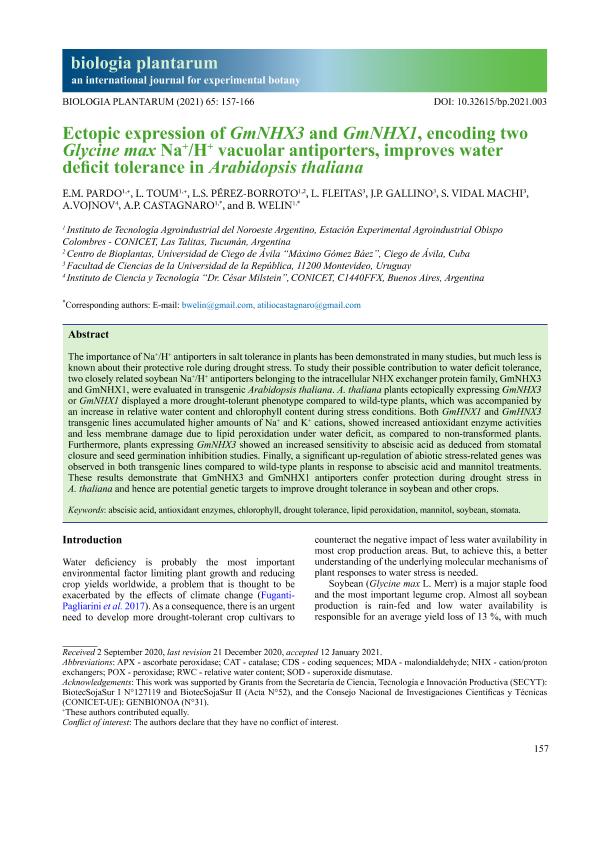Artículo
Ectopic expression of GmNHX3 and GmNHX1, encoding two Glycine max Na+/H+ vacuolar antiporters, improves water deficit tolerance in Arabidopsis thaliana
Pardo, Esteban Mariano; Toum, Laila ; Pérez Borroto, Lucía Sandra
; Pérez Borroto, Lucía Sandra ; Fleitas, L.; Gallino, J. P.; Machi, S.; Vojnov, Adrián Alberto
; Fleitas, L.; Gallino, J. P.; Machi, S.; Vojnov, Adrián Alberto ; Castagnaro, Atilio Pedro
; Castagnaro, Atilio Pedro ; Welin, Björn
; Welin, Björn
 ; Pérez Borroto, Lucía Sandra
; Pérez Borroto, Lucía Sandra ; Fleitas, L.; Gallino, J. P.; Machi, S.; Vojnov, Adrián Alberto
; Fleitas, L.; Gallino, J. P.; Machi, S.; Vojnov, Adrián Alberto ; Castagnaro, Atilio Pedro
; Castagnaro, Atilio Pedro ; Welin, Björn
; Welin, Björn
Fecha de publicación:
06/2021
Editorial:
Springer
Revista:
Biologia Plantarum
ISSN:
0006-3134
Idioma:
Inglés
Tipo de recurso:
Artículo publicado
Clasificación temática:
Resumen
The importance of Na+/H+ antiporters in salt tolerance in plants has been demonstrated in many studies, but much less is known about their protective role during drought stress. To study their possible contribution to water deficit tolerance, two closely related soybean Na+/H+ antiporters belonging to the intracellular NHX exchanger protein family, GmNHX3 and GmNHX1, were evaluated in transgenic Arabidopsis thaliana. A. thaliana plants ectopically expressing GmNHX3 or GmNHX1 displayed a more drought-tolerant phenotype compared to wild-type plants, which was accompanied by an increase in relative water content and chlorophyll content during stress conditions. Both GmHNX1 and GmHNX3 transgenic lines accumulated higher amounts of Na+ and K+ cations, showed increased antioxidant enzyme activities and less membrane damage due to lipid peroxidation under water deficit, as compared to non-transformed plants. Furthermore, plants expressing GmNHX3 showed an increased sensitivity to abscisic acid as deduced from stomatal closure and seed germination inhibition studies. Finally, a significant up-regulation of abiotic stress-related genes was observed in both transgenic lines compared to wild-type plants in response to abscisic acid and mannitol treatments. These results demonstrate that GmNHX3 and GmNHX1 antiporters confer protection during drought stress in A. thaliana and hence are potential genetic targets to improve drought tolerance in soybean and other crops.
Archivos asociados
Licencia
Identificadores
Colecciones
Articulos(ICT - MILSTEIN)
Articulos de INST.DE CS. Y TECNOLOGIA "DR. CESAR MILSTEIN"
Articulos de INST.DE CS. Y TECNOLOGIA "DR. CESAR MILSTEIN"
Citación
Pardo, Esteban Mariano; Toum, Laila; Pérez Borroto, Lucía Sandra; Fleitas, L.; Gallino, J. P.; et al.; Ectopic expression of GmNHX3 and GmNHX1, encoding two Glycine max Na+/H+ vacuolar antiporters, improves water deficit tolerance in Arabidopsis thaliana; Springer; Biologia Plantarum; 65; 6-2021; 157-166
Compartir
Altmétricas



